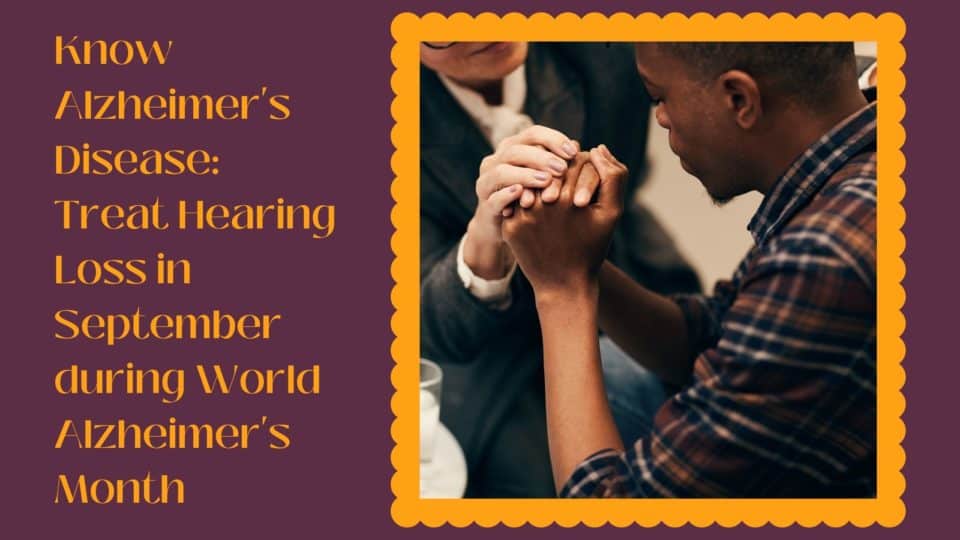- A Closer Look at Common Myths About Hearing Loss - May 7, 2024
- The Impact of Pets on Emotional and Hearing Health - April 26, 2024
- Strategies for Coping with Single-Sided Deafness - April 16, 2024
Alzheimer’s disease is a type of cognitive decline that causes memory loss and confusion. There appears to be a shroud of misunderstanding, misinterpretation, and even shame around Alzheimer’s disease and other kinds of dementia beyond this knowledge.
September has been designated as World Alzheimer’s Month to help combat this. World Alzheimer’s Month aims to increase awareness of Alzheimer’s disease, eliminate stigma, and motivate society to take action. We can work together to make Alzheimer’s disease more accessible and approachable and support research into new treatment choices and a cure.
As hearing professionals, we at New Leaf Hearing Clinic are fascinated by the connections between our brains and our ears/auditory systems, how they communicate, and how they interact. It is necessary to first have a fundamental understanding of Alzheimer’s disease to do so. This involves drawing awareness to the link between hearing loss and Alzheimer’s disease.
What is Alzheimer’s Disease?
Alzheimer’s disease is the most common type of dementia, accounting for 60-80% of cases. Dementia is not a disease in and of itself but rather a word for a severe decrease in mental ability that interferes with daily life.
Alzheimer’s disease is characterized by an accumulation of twisted protein bundles and amyloid plaque in the brain, which causes damage and impairs the brain’s ability to communicate and function correctly.
Alzheimer’s disease has early symptoms that are difficult to identify, but the disease advances and worsens over time. People with Alzheimer’s disease will notice memory problems at first, such as forgetting appointments or previously learned knowledge. Alzheimer’s disease eventually takes away a person’s capacity to engage with their surroundings, care for themselves, hold conversations, or remember their loved ones.
Alzheimer’s disease is widespread, with a new person developing the condition every three seconds somewhere on the planet.
How healthy hearing helps our brains
We can now talk about how our ears and brains work together to keep our hearing healthy and functional. We all know what Alzheimer’s disease is and how it affects a healthy brain. Even the smallest sounds require a highly complex auditory function to be heard.
- The outer ear collects sound waves and sends them through the ear canal.
- Our eardrums and three tiny bones in our middle ear quiver as a result of these sound waves.
- Following that, the vibrations cause a liquid inside our middle ear’s cochlea to vibrate, move, and “wave.”
- The microscopic hair cells inside the cochlea then basically “surf” these “waves,” bending and swaying in response to the movement.
- The bending of these microscopic hair cells converts vibrations into electrical signals, which are then delivered to the brain for processing via the auditory nerve.
- After traveling the auditory nerve, the electric signals are ready to be processed by the brain into identifiable sounds.
It’s incredible to consider that all of these stages take place to process every sound we hear, from listening to our favorite song to noticing the rustling of the leaves.
Alzheimer’s Disease and Hearing Loss
Now that we understand how a healthy brain and a healthy auditory system work together to allow us to hear, we can talk about how our ears and our brains are linked.
Hearing loss has been linked to the development of dementia, such as Alzheimer’s disease, in numerous studies, notably in the last few decades. According to one of the most well-known studies, those with modest hearing loss were twice as likely to develop dementia as their non-hearing impaired friends. In contrast, those with severe loss were five times as likely.
Scientists are still puzzled as to why this link exists, although two different explanations have been proposed. The first concludes that the two are linked because hearing loss frequently leads to social isolation, leading to dementia. According to the second theory, when the brain expends all of its energy and resources trying to hear and understand, there are fewer resources available for other tasks such as problem-solving and remembering.
Do you need a hearing test?
What better time than World Alzheimer’s Month to book a hearing screening with our team? If you’ve experienced changes in your hearing, memory, or cognitive ability, you will undoubtedly benefit. Because our ears and brains are so intertwined, taking care of one can help us take care of the other.

